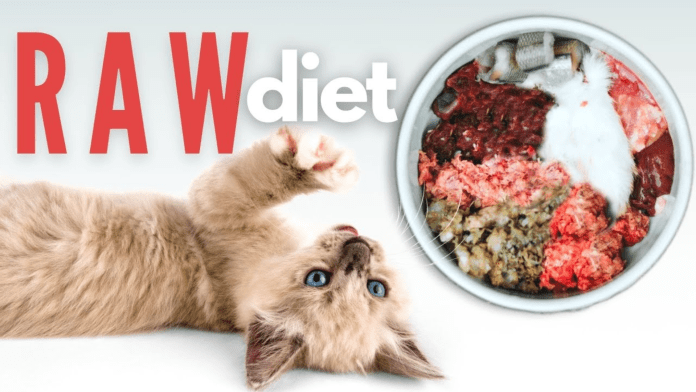As pet owners, we are constantly seeking ways to enhance our beloved furry companions’ well-being. Cats, being obligate carnivores, require a diet rich in animal protein to thrive. In recent years, veterinarians and pet nutrition experts have been increasingly advocating for a game-changing approach to feline nutrition – the raw food diet. This revolutionary feeding regimen aligns with a cat’s natural dietary requirements, unlocking their true health potential. In this article, we delve into the benefits, risks, and considerations of a raw food diet for cats, exploring why many vets are raving about this transformative approach to feline nutrition.
Understanding the Raw Food Diet for Cats:
The raw food diet for cats is based on the principle of feeding them uncooked, unprocessed, and biologically appropriate foods that mimic their ancestors’ diets in the wild. This diet typically consists of raw meat, organs, bones, and may include certain vegetables and supplements. Advocates argue that this diet optimizes a cat’s nutritional intake, better reflecting their evolutionary needs as obligate carnivores.
A primary benefit of this diet is the high protein content, which supports muscle maintenance, healthy skin, and a glossy coat. Additionally, proponents claim that the natural enzymes present in raw food aid in digestion and improve overall gastrointestinal health.
The Advantages of a Raw Food Diet:
Vets and cat owners have observed numerous advantages when transitioning to a raw food diet:
a. Improved Digestive Health: Raw food provides essential enzymes and nutrients that can alleviate digestive issues like constipation and diarrhea.
b. Weight Management: Cats are less likely to become overweight on a raw food diet, as it contains fewer carbohydrates and fillers often found in commercial cat food.
c. Increased Energy and Vitality: Many cat owners report their pets becoming more active and playful after switching to a raw food diet, indicating improved overall health.
d. Enhanced Dental Health: Chewing raw meat and bones helps to clean a cat’s teeth, reducing the risk of dental problems.
e. Better Coat and Skin Condition: The high-quality protein and essential fatty acids in raw food contribute to a lustrous coat and healthy skin.
f. Allergy and Sensitivity Relief: Some cats with food allergies or sensitivities may experience relief when fed a raw food diet free from common allergens present in processed food.
Potential Risks and Considerations:
While the raw food diet offers numerous benefits, it is essential to consider potential risks and challenges:
a. Nutritional Imbalance: Preparing a balanced raw food diet requires meticulous attention to detail, as cats require specific nutrients in precise proportions.
b. Bacterial Contamination: Raw food carries a risk of bacterial contamination, which can pose health hazards to both cats and their human caretakers.
c. Bone Hazards: Bones, although natural sources of calcium, can present choking or intestinal obstruction risks if not appropriately handled or if the cat gulps large pieces.
d. Time and Effort: Preparing a raw food diet can be time-consuming and may require extra effort compared to the convenience of commercial cat food.
e. Transition Difficulties: Some cats may be resistant to change, making the transition to a raw food diet challenging.
Safely Implementing a Raw Food Diet:
Consulting with a veterinarian is crucial before making any dietary changes for a cat. A veterinarian can offer guidance on creating a balanced raw food meal plan tailored to the cat’s individual needs, age, and health status. It is vital to source high-quality ingredients, including meat from reputable sources, to minimize the risk of contamination.
Final Thoughts:
The game-changing raw food diet for cats has indeed captured the attention of veterinarians and pet owners alike, promising to unleash their true health potential. By offering a nutritionally balanced diet that aligns with a cat’s evolutionary needs, proponents argue that this feeding regimen can lead to improved energy levels, better digestive health, and enhanced overall well-being. However, it is essential to approach this diet with caution and awareness of potential risks. Ultimately, with proper guidance from a veterinarian and responsible sourcing of ingredients, the raw food diet can be a valuable option for those seeking to provide their feline companions with optimal nutrition and health.





